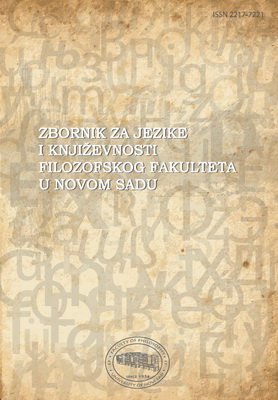TELIČNE SITUACIJE I IMPERFEKTIVNI GLAGOLSKI VID U ENGLESKOM I RUMUNSKOM JEZIKU
TELIC SITUATIONS AND THE IMPERFECTIVE ASPECT IN ENGLISH AND ROMANIAN LANGUAGES
Author(s): Mihaela, Aleksandar LazovićSubject(s): Theoretical Linguistics, Philology
Published by: Филозофски факултет, Универзитет у Новом Саду
Keywords: telicity; imperfective aspect; accomplishments; achievements;
Summary/Abstract: This paper analyses imperfective, telic situations in English and Romanian in the attempt to explain the contradiction which implies a situation which tends towards a well specified goal, butthe use of the imperfective aspect excludes and neutralizes the mentioned endpoint. This paper also aims to determine the correlations between the semantic category of telicity and the imperfective aspect in English and Romanian. The telic/atelic distinction is one of the basic semantic characteristics of verbs and as such it can be considered a language universal. It exists in the Romanian language as well, but it has not been thoroughly examined nor clearly defined. Thus, one of the aims of this analysis is to examine the influence of the semantic characteristic of telicity on Romanian verbs. It is a well known fact that telic situations tend towards a specified goal or endpoint after which the situation naturally ends. This paper attempts to further specify the mentioned hypothesis. It argues that telicity implies a change of state of the situation, i. e. a qualitative change of a situation. The paper also argues that the imperfective aspect does not only imply duration, but it views the situation as a structure which may have segments and development, as well as tend towards a goal, but it will never be reached since imperfectivity does not include the end of a situation. A certain correlation exists between the semantic category of telicity and the Romanian distinctive feature [change] which in some contexts denotes a change of state and in other a change of position. The analysis has shown that imperfective accomplishments are in fact unbounded telic situations, i. e. situations which tend towards a goal, but it is not reached since the imperfective form (progressive in English and imperfect in Romanian) is used. The notion of an endpoint is a part of the meaning of accomplishments and achievements. The analysis has also shown that imperfective achievements do not involve the preparatory activity before reaching the goal, like accomplishment do. With accomplishments the preparatory activity is given lexically, whereas with achievements it is contextually implied and it is not a part of the meaning of an achievements. The analysis of imperfective achievements has shown that it is the preparatory activity that lasts in time, not achievements themselves. On the other hand, imperfective accomplishments entail the preparatory activity in their meaning, thus implying duration. In conclusion, imperfective aspect does not exclude the goal, it only specifies that it is not attained since the situation is in progress. Naturally, the goal can potentially be reached.
Journal: Zbornik za jezike i književnosti Filozofskog fakulteta u Novom Sadu
- Issue Year: 1/2011
- Issue No: 1
- Page Range: 57-69
- Page Count: 12
- Language: Serbian

